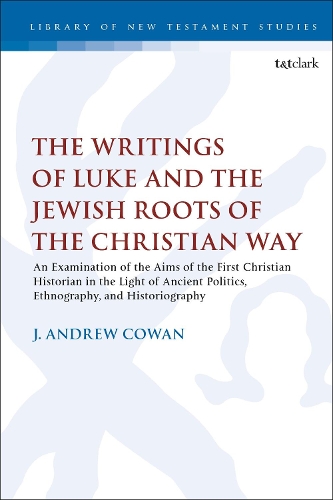
The Writings of Luke and the Jewish Roots of the Christian Way: An Examination of the Aims of the First Christian Historian in the Light of Ancient Politics, Ethnography, and Historiography
(Paperback)
Available Formats
Publishing Details
The Writings of Luke and the Jewish Roots of the Christian Way: An Examination of the Aims of the First Christian Historian in the Light of Ancient Politics, Ethnography, and Historiography
By (Author) Dr. J. Andrew Cowan
Bloomsbury Publishing PLC
T.& T.Clark Ltd
20th August 2020
United Kingdom
Classifications
Tertiary Education
Non Fiction
Criticism and exegesis of sacred texts
226.4067
Physical Properties
Paperback
232
Width 156mm, Height 234mm
327g
Description
J. Andrew Cowan challenges the popular theory that Luke sought to boost the cultural status of the early Christian movement by emphasising its Jewish roots associating the new church with an ancient and therefore respected heritage. Cowan instead argues that Luke draws upon the traditions of the Old Testament and its supporting texts as a reassurance to Christians, promising that Jesus life, his works and the church that follow legitimately provide fulfilment of Gods salvific plan. Cowans argument compares Lukes writings to two near-contemporaries, Dionysius of Halicarnassus and T. Flavius Josephus, both of whom emphasized the ancient heritage of a people with cultural or political aims in view, exploring how the writings of Luke do not reflect the same cultural values or pursue the same ends. Challenging assumptions on Lukes supposed attempts to assuage political concerns, capitalize on antiquity, and present Christianity as an inner-Jewish sect, Cowan counters with arguments for Luke being critical of over-valuing tradition and defining the Jewish people as resistant to God and His messages. Cowan concludes with the argument that the apostle does not strive for legitimisation of the new church by previous cultural standards, but instead provides theological reassurance to Christians that Gods plan has been fulfilled, with implications for broader debate.
Author Bio
J. Andrew Cowan holds a PhD in New Testament from the University of St Andrews, UK.
